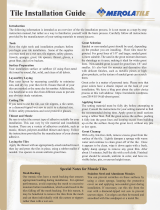Page is loading ...

WWW.SOLISTONE.COM
INFORMATION & GUIDELINES FOR THE INSTALLATION OF MARDI GRAS GLASS
RECOMMENDED INSTALLATION
SOLISTONE Mardi Gras Glass tiles are not recommended for areas that may be subject to heavy
impact, heavy abrasion, and areas where temperatures can exceed 130 degrees Fahrenheit.
These tiles are not recommended for floors, exterior applications or areas exposed to direct
sunlight as color will fade.
NOTE: this document contains only guidelines for the installation process. A professional installer
should always be consulted to discuss the specific parameters surrounding your project.
SUBSTRATES
All substrates should be firmly fixed, flat, clean, dry and free of contaminants such as dust, oil,
paint, sealers etc. to ensure proper adhesion. Painted surfaces must be scuffed or sanded for the
product and adhesive to bond correctly. Wet areas need special attention and require
appropriate substrates, e.g. concrete, cement boards (compressed sheet), and/or treated
plywood. The use of reinforced waterproof membranes is suggested.
WATERPROOF MEMBRANES
Waterproof membranes prevent leakage of water through to the sub-floor framing and/or
habitable spaces below. Particular attention must be paid to: carrying the membrane up the wall,
outside shower boxes, installation of bond breakers, and sealing around penetrations. It is
strongly recommended that membrane systems be used in all wet areas. Some systems may
involve the use of a primer.
CUTTING
The glass can easily be cut with a curved splitting clamp or a glass cutter. The mesh back can
easily be cut with a utility knife.
ADHESIVE
Important: No adhesives with strong acid and alkaline cement should be used when installing this
product. Only neutral cement is allowed.
Follow the adhesive manufacturer’s instructions carefully. We do not recommend one brand of
adhesive over another. Please check with your local tile supply store for alternative and
comparable products.
The manufacturer's literature will explain if the adhesive product is suitable for interiors and/or
exteriors, as well as walls and floors. Most thinset mortars with a latex additive (multi purpose
and polymer modified thinsets) are adequate for installing glass. A cement-based adhesive is
generally suitable on masonry substrates where no movement is anticipated. Where slight
movement could occur through thermal or pedestrian loads, a modified cement adhesive should

WWW.SOLISTONE.COM
be used as a minimum. A 1/4” – 1/8” notch trowel is recommended for most applications. Set the
tile in place gently tapping it in with a grout float to ensure 100% adhesive coverage.
GROUTING
Grout should be designed for external or internal conditions whichever may be the case. Non-
Sanded grout is generally recommended for any grout joint 1/8” or smaller. Grouts are
ordinarily a water mix but where some flexibility may be needed, a latex additive or similar
product should be used. It is important to wait the interval recommended by the adhesive
manufacturer before grouting to minimize dirt ingress between the squares and avoid the
opportunity for dislodging.
SEALANTS
The glass tiles do not have to be sealed but we strongly recommend sealing the grout after
installation to help prevent it from absorbing stains.
CARE & CLEANING
SOLISTONE Mardi Gras Glass tiles must be regularly cleaned and maintained to extend the life
and beauty of the tile. The tiles can be cleaned with a neutral mild detergent, or glass cleaner.
Any spills should be cleaned quickly to lessen the degree of the stain to the grout. Do not use
abrasive cleaners, powders, scouring pads, steel wool or sandpaper.
/


